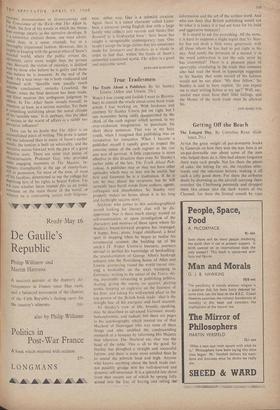True Tradesmen •
WHEN I was young and foolish I went to Blooms- bury to consult the oracle about some book trade article I was working on. With briskness and courtesy Sir Stanley Unwin put me right. but I can remember being oddly disappointed by the . chink of the cash register which seemed, to my .over-exuberant imagination, to punctuate his short sharp sentences. That was in my hazy youth, When I imagined that publishing was an occupation for romantics. When I became a publisher myself I rapidly grew to respect the concrete music of the cash register as the sine qua non of survival. A little experience is more effective in this direction than even Sir Stanley's earlier table of the law, The Truth About Pub- lishing. A publisher may or may not have other aptitudes which may or may not be useful, but first and foremost he is a tradesman. If he is not, he may please the reviewers, but he will certainly hear harsh words from authors. agents. colleagues and shareholders. Sir Stanley very properly makes no bones about it in his long and forthright success story.
Anybody who comes to this autobiographical record looking for -literary chat will be dis- appointed. Nor is there much energy wasted on self-examination, or upon- investigation of the characters and motives of those upon whom Sir Stanley's breast-forward progress has impinged. A happy, busy, pious, frugal childhood; a brief spell in shipping when he began to realise his commercial acumen; the building up of his uncle's (T. Fisher Unwin's) .business; journeys abroad to perfect his knowledge of bookselling;' the transformation of George Allen's bankrupt concern into the flourishing house of Allen and Unwin: journeying round the world (never mis- sing a bookseller on the way). tramping in Germany. writing to the editor of the Times, ski- ing, inexorably advancing in publishing politics, skating, giving the enemy no quarter, playing tennis, keeping an eagle-eye on the business of his firm, and taking his well-earned place as the lop person of the British book trade------that is the straight line of his energetic and lucid account.
Sir Stanley's view of life, broadly speaking. may be described as advanced Victorian, stoutly nonconformist, and radical: but there are pages in his autobiography which remind me of that Macleod of Dunvegan who was none of these things and who snubbed the condescending monarch at a banquet by informing His Majesty that wherever The Macleod sat, that was the head of the table. This is all to the good. Sir Stanley has ploughed a straight and successful furrow, and there is none more -entitled than he to sound the pibroch loud and high. Anyone who knows anything about the book trade can- not possibly grudge him his well-deserved and dynamic self-assurance. It is a splendid late shoot from that society out of _which he sprang fully armed into the fray of buying and .selling the
information and the art of the written word. And who can deny that British publishing would not be what it is today if it had not been for his bold and aggressive instincts?
It is stupid to ask for everything. All the same, it is hard to suppress a slight regret that Sir Stan- ley has not dealt a little more generously with all those whom he has had to put right in his day. And surely the intrusion of a second 's' in the word subtraction is not the only error he has committed? There is a pleasant piece of apocrypha circulating in the trade that someone who had read the book in typescript suggested to Sir Stanley that some record of his failures would not be out place. 'My dear fellow,' Sir Stanley is said to have replied, 'do you expect me to start writing fiction at my age?' Well, suc- cessful men must have their little failings, and the Monty of the book trade must be allowed his.
IAIN HAMILTON


































 Previous page
Previous page